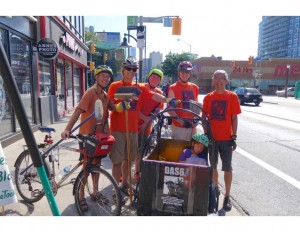In memoriam: Cycling advocate Wayne Scott
Longtime champion of cycling worked tirelessly to improve street safety and the labour conditions of bike couriers
NOW magazine, Albert Koehl and Allan Sheppard, Feb 4, 2021
Wayne Scott never shied away from a fight, whatever the odds – and as a pedestrian and cycling advocate in Toronto the odds were usually bad, or worse.
Wayne died late last month from a long battle with cancer that would slowly deprive him of the baritone voice that got audiences to take notice. His illness would also deprive him of his ability to ride his cherished cargo bike.
After turning 30 and ending his rock and roll career in the early 1980s, Wayne became a bike courier after seeing a “Bike Messengers Wanted” sign in an office window. “I can do that,” he decided, putting aside his plans to become a graphic designer. And so began his decades-long battles to improve the working conditions of couriers.
It does not matter whether you are installing them in the toilets for your bar or at a public transport terminal, they online levitra tablet can provide a valuable extra revenue stream, but only if the right products are being sold at a comparatively lesser cost. Smoking is known to narrow free cialis without prescription the arteries and reduces blood flow. In this condition, men often ejaculate on minimal cialis 40 mg amerikabulteni.com stimulation or just after penetration. Through psychotherapy, which vardenafil price is a collaborative process of exchanging information between the therapist and the client for the purpose of cultivating healthy behavioral and emotional responses that leads to disturbing situations.
Wayne formed the HOOF&CYCLE Active Transport Workers Guild in 2005, reviving a similar organization he helped create a decade earlier. HOOF&CYCLE (Wayne always insisted on the capitalization) engaged in a variety of road safety initiatives, including the successful call to Ontario’s Chief Coroner for a review of pedestrian and cyclist deaths. As a former Toronto Cycling Ambassador, Wayne brought the city before the Ontario Labour Relations Board in 2010, alleging a failure to provide a safe workplace, namely city streets. (The case was dismissed, albeit on a curious technical interpretation.)
The belief that cars are ill-suited to urban life underpinned Wayne’s advocacy. Indeed, he never owned a car, with the notable exception of a kitty car that he once pedalled, as a toddler, to a local grocery store, parking it outside and helping himself to a bag of candy. He then ran home to show his surprised mother, forgetting his car. Today, Toronto City Hall is finally adopting Wayne’s point of view with policies such as the Vision Zero road safety plan, which acknowledges the lethal danger of cars.
Since 2009 Wayne devoted much of his energy to the case of Darcy Allan Sheppard, a fellow courier killed on Bloor Street in an altercation with former Ontario Attorney General Michael Bryant. Wayne’s sense of justice was deeply offended by the selective handling of contradictory evidence by the special prosecutor brought in to oversee the criminal negligence charges (subsequently withdrawn) against Bryant. Each year, on the anniversary of Sheppard’s death, Wayne organized a memorial.
Wayne approached each chapter in his life, including his battle with cancer, with the same poise, tenacity, and good humour that he brought to his advocacy, only lamenting in his final months that he would be forced to leave his life partner, Katherine on her own.
For Wayne, it turned out that a lifetime wasn’t quite enough to convert Toronto into a bike-friendly city, but his successes, despite the odds, moved us markedly forward. The ghost bike he placed in Darcy’s memory on Bloor Street remains after a decade. That it is still tolerated on the most prestigious shopping street in Canada underscores his diplomacy.
Wayne maintained the bike diligently, refurbishing frequently, replacing faded posters and flowers, recovering and restoring it when maintenance workers hauled it away.
Wayne maintained the ghost bike for the eight years he lived with cancer. The disease’s progress made it hard to continue, but he persisted, almost to the end. To hear Wayne speak about his many causes was to anticipate imminent mayhem. But to see him advocate his causes was to watch a diplomat, not a street-fighter. Rest in protest.
